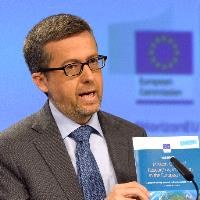(BRUSSELS) – The European Commission continued its detailed proposals for the EU’s next long-term budget Thursday, announcing the new Horizon Europe programme of EUR 100 billion for research and innovation.
“Horizon 2020 is one of Europe’s biggest success stories,” said the EU’s Research Commissioner Carlos Moedas. “The new Horizon Europe programme aims even higher. As part of this, we want to increase funding for the European Research Council to strengthen the EU’s global scientific leadership, and re-engage citizens by setting ambitious new missions for EU research.”
While continuing to drive scientific excellence through the European Research Council (ERC) and the Marie Sklodowska-Curie fellowships and exchanges, Horizon Europe will introduce the following main new features:
- A European Innovation Council (EIC) to help the EU become a frontrunner in market-creating innovation:The Commission’s proposal will establish a one-stop shop to bring the most promising high potential and breakthrough technologies from lab to market application, and help the most innovative start-ups and companies scale up their ideas. The new EIC will help identify and fund fast-moving, high-risk innovations with strong potential to create entirely new markets. It will provide direct support to innovators through two main funding instruments, one for early stages and the other for development and market deployment. It will complement the European Institute of Innovation and Technology (EIT).
- New EU-wide research and innovation missions focusing on societal challenges and industrial competitiveness:Under Horizon Europe, the Commission will launch new missions with bold, ambitious goals and strong European added valueto tackle issues that affect our daily lives. Examples could range from the fight against cancer, to clean transport or plastic-free oceans. These missions will be co-designed with citizens, stakeholders, the European Parliament and Member States.
- Maximising the innovation potential across the EU: Support will be doubled for Member States lagging behind in their efforts to make the most of their national research and innovation potential. Moreover, new synergies with Structural and Cohesion Funds will make it easy to coordinate and combine funding and help regions embrace innovation.
- More openness: The principle of ‘open science’ will become the modus operandi of Horizon Europe, requiring open access to publications and data. This will assist market uptake and increase the innovation potential of results generated by EU funding.
- A new generation of European Partnerships and increased collaboration with other EU programmes: Horizon Europewill streamline the number of partnerships that the EU co-programmes or co-funds with partners like industry, civil society and funding foundations, in order to increase their effectiveness and impact in achieving Europe’s policy priorities.Horizon Europe will promote effective and operational links with other future EU programmes, like Cohesion Policy, the European Defence Fund, the Digital Europe Programme and the Connecting Europe Facility, as well as with the international fusion energy project ITER.
The Joint Research Centre (JRC), the Commission’s science and knowledge service, will continue to contribute with scientific advice, technical support and dedicated research.
About two-thirds of Europe’s economic growth over the last decades has been driven by innovation. Horizon Europe is expected to generate new and more knowledge and technologies, promoting scientific excellence, and to have positive effects on growth, trade and investment and significant social and environmental impact.
The proposed budget allocation of 100 billion for 2021-2027 includes 97.6 bn under Horizon Europe (3.5 bn of which will be allocated under the InvestEU Fund) and 2.4 bn for the Euratom Research and Training Programme. The Euratom programme, which funds research and training on nuclear safety, security and radiation protection, will have an increased focus on non-power applications such as healthcare and medical equipment, and will also support the mobility of nuclear researchers under the Marie Sklodowska-Curie Actions.
- EU funding for Research and Innovation 2021-2027
- EU Research and Innovation success stories
Horizon Europe – the next research and innovation framework programme


